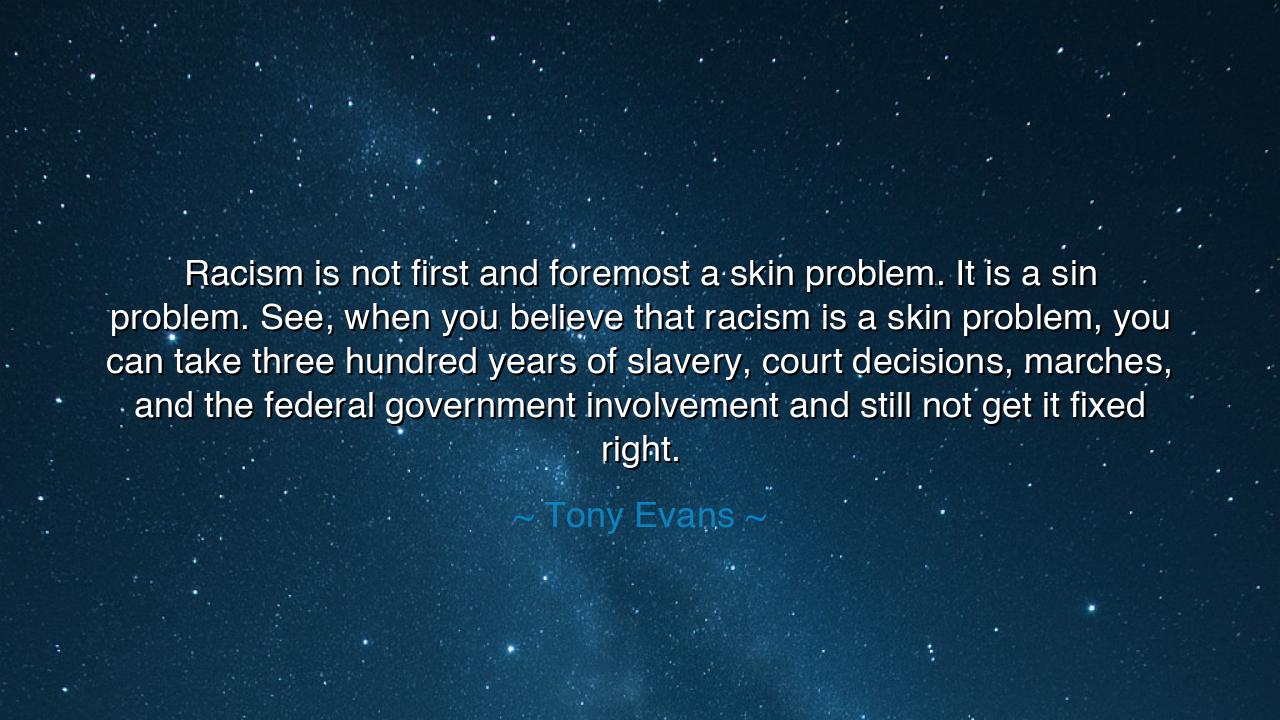
Racism is not first and foremost a skin problem. It is a sin
Racism is not first and foremost a skin problem. It is a sin problem. See, when you believe that racism is a skin problem, you can take three hundred years of slavery, court decisions, marches, and the federal government involvement and still not get it fixed right.






Hear, O children of justice and truth, the words of Tony Evans, a preacher of both courage and compassion: “Racism is not first and foremost a skin problem. It is a sin problem. See, when you believe that racism is a skin problem, you can take three hundred years of slavery, court decisions, marches, and the federal government involvement and still not get it fixed right.” In this declaration, Evans pierces through the surface of human prejudice to strike at the heart of the matter—the moral and spiritual corruption that fuels hatred and division. His words do not merely describe a social condition; they unveil a spiritual sickness, a wound in the soul of humankind that no legislation or institution alone can heal.
Tony Evans, one of America’s most respected pastors and theologians, spoke from decades of ministry and reflection on the brokenness of society. He had seen progress—laws changed, movements risen, and voices united—yet still, the specter of racism lingered. Why? Because, he argues, the root of racism is not found in the color of the skin but in the darkness of the human heart. To call it merely a “skin problem” is to misunderstand its depth, to treat the symptom rather than the disease. Evans reminds us that sin, the turning away from divine love and truth, manifests in pride, greed, fear, and hatred—and racism is its poisonous fruit.
History itself confirms this truth. Consider the aftermath of the American Civil War: slavery was abolished, and freedom declared. Yet the Reconstruction period gave birth to segregation, discrimination, and systems that perpetuated inequality. The laws had changed, but the hearts of many had not. For generations, prejudice continued to breathe in the minds of men and women, cloaked now in legality and culture rather than open chains. This is what Evans means when he says that even with “court decisions, marches, and government involvement, it’s still not fixed right.” The law can restrain evil, but only repentance can remove it.
The ancient philosophers and prophets knew this well. The Hebrew prophets cried out that justice and righteousness must dwell within the heart, not merely in the courts. Christ Himself taught that the greatest commandments were to love God and love one’s neighbor, for only through such love can the walls of division fall. Evans’s message echoes this eternal truth: that moral transformation must precede social transformation, that hearts must be purified before laws can achieve their full purpose. For racism, like all sin, begins where love has died.
There are countless heroes who understood this spiritual struggle. Dr. Martin Luther King Jr., though a man of action and advocacy, always declared that the battle for civil rights was “not merely a political struggle, but a spiritual one.” He believed that hatred cannot be conquered by legislation alone, but by the redemptive power of love and forgiveness. His marches were not just protests—they were prayers made visible, movements of the spirit as much as of the body. Evans walks in that same prophetic tradition, calling not for hatred of the oppressor, but for healing of the oppressor’s heart.
The lesson, then, is clear: no law can save a soul, and no government can legislate love. Systems can be corrected, but only spiritual renewal can bring lasting reconciliation. The fight against racism must therefore be both external and internal—waged in the public square, yes, but also within the chambers of every heart. Each person must confront the pride, fear, or indifference that allows prejudice to survive, and invite in its place humility, empathy, and truth.
Practical actions arise from this teaching: seek justice in your society, but never forget to cultivate virtue within yourself. Teach children not only equality by law but equality by spirit. Stand against discrimination in the world, but also examine your own biases with courage. True healing begins when individuals are transformed, for when hearts are changed, nations are renewed.
Thus, Tony Evans’s words resound not merely as critique but as a call to redemption. He teaches that the roots of racism lie not in skin, but in sin; not in difference, but in disobedience to the divine command to love. The cure, then, is not only social reform but spiritual rebirth—a turning back to the light of compassion and justice that has guided the noblest hearts through all ages. Let every soul who hears these words remember: laws may restrain evil, but only love destroys it.






AAdministratorAdministrator
Welcome, honored guests. Please leave a comment, we will respond soon